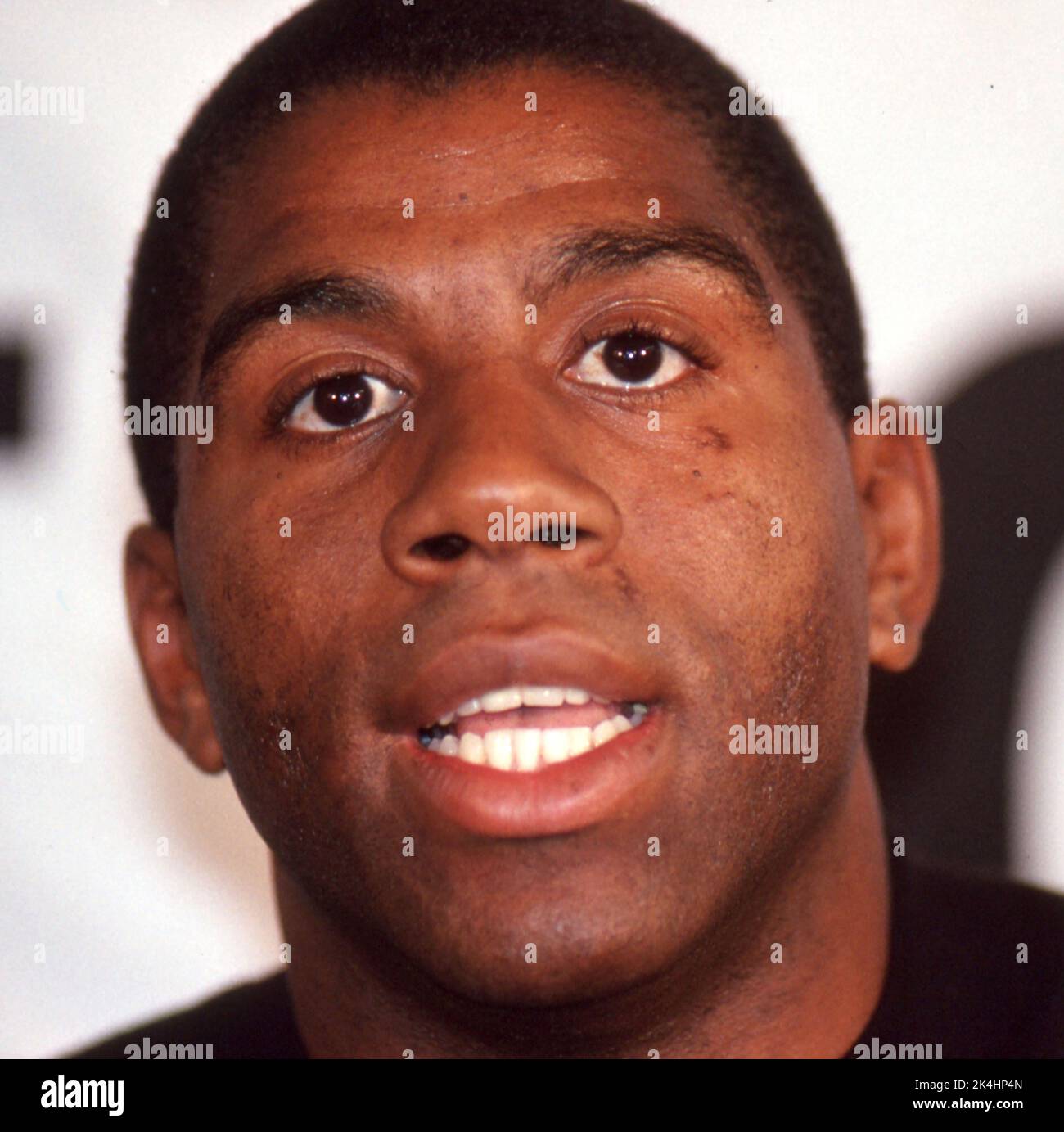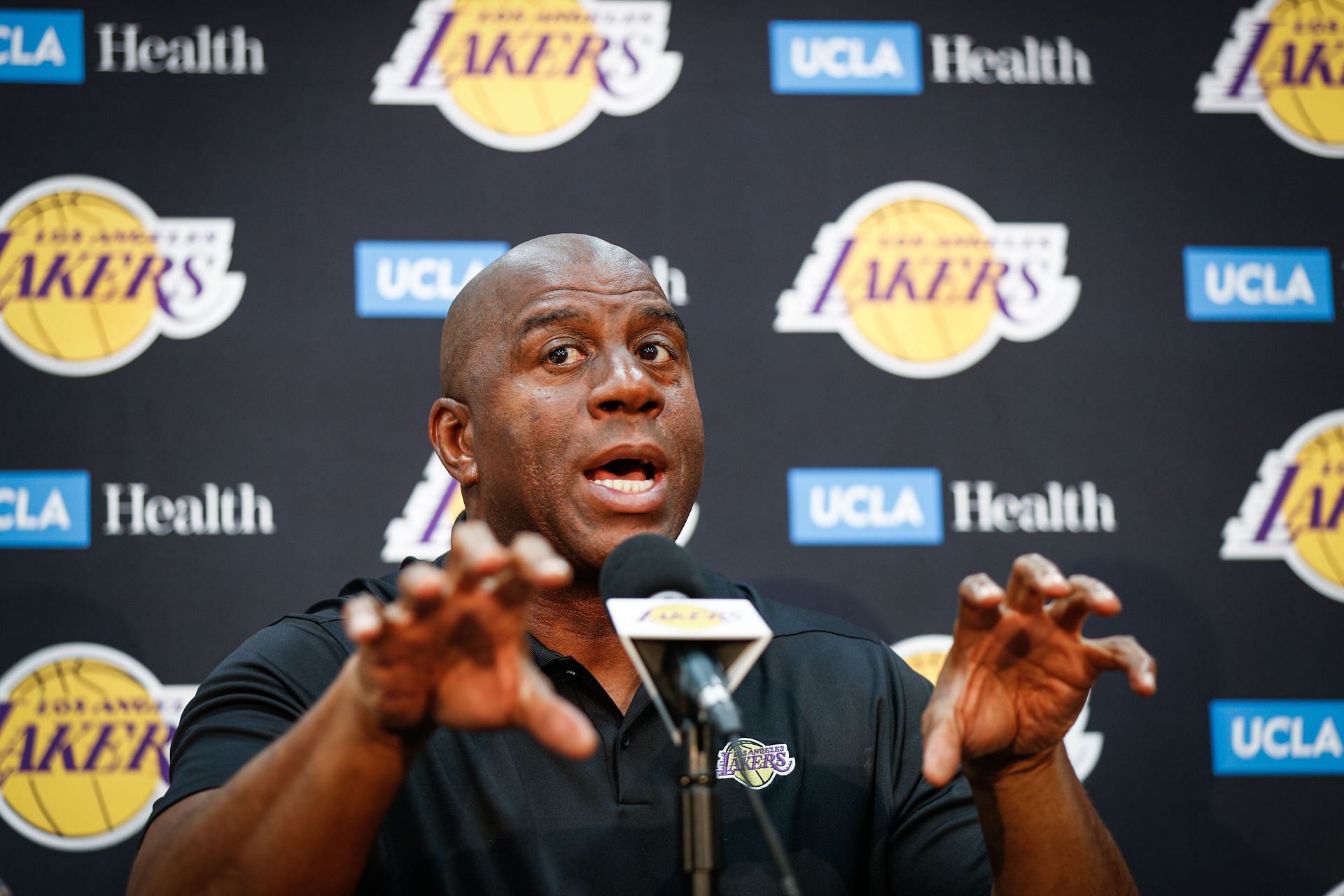Are the whispers of the legendary Magic Johnson's demise true? Rest assured, the reports of Magic Johnson's passing are not just greatly exaggerated, they are unequivocally false. This article delves into the swirling rumors, separating fact from fiction and offering a clear picture of the basketball icon's current status.
In the age of instantaneous information and the rapid spread of misinformation, the internet can be a double-edged sword. While connecting people globally and facilitating instant access to news, it also provides fertile ground for rumors and speculation to flourish, often with devastating consequences. This is especially true in the case of high-profile figures, whose lives and legacies are often subject to intense public scrutiny. Recently, this phenomenon has played out in the digital space concerning Earvin "Magic" Johnson Jr., a name synonymous with basketball excellence and unwavering positivity.
Born in Lansing, Michigan, Magic Johnson has captivated the world with his extraordinary talent and charismatic personality. From his early days dominating the court at Everett High School to his legendary career with the Los Angeles Lakers, Johnson has consistently redefined the game. His dazzling ball-handling skills, court vision, and infectious enthusiasm have made him one of the most beloved and recognizable athletes of all time. Beyond his athletic achievements, Johnson has also made a significant impact off the court, becoming a successful businessman, philanthropist, and motivational speaker. His battle with HIV and his subsequent advocacy work have further solidified his place as a role model and a symbol of resilience.
| Category | Details |
|---|---|
| Full Name | Earvin "Magic" Johnson Jr. |
| Date of Birth | August 14, 1959 |
| Place of Birth | Lansing, Michigan, USA |
| Spouse | Cookie Johnson |
| Children | Earvin Johnson III, Elisa Johnson, Andre Johnson |
| Primary Sport | Basketball |
| Position | Point Guard |
| NBA Teams | Los Angeles Lakers (1979-1991, 1996) |
| NBA Championships | 5 (1980, 1982, 1985, 1987, 1988) |
| NBA Finals MVP | 3 (1980, 1982, 1987) |
| NBA MVP | 3 (1987, 1989, 1990) |
| Other Achievements | 12-time NBA All-Star, 9-time All-NBA First Team, 1992 Olympic Gold Medalist |
| Business Ventures | Magic Johnson Enterprises, Starbucks franchises, movie theaters, etc. |
| Philanthropy | Magic Johnson Foundation |
| Reference Website | NBA.com Player Profile |
Despite the evidence of his continued presence, rumours of Magic Johnson's death have recently surfaced, spreading across social media platforms. Such reports, which began to circulate on platforms like WhatsApp and on some media accounts, often gain traction quickly due to their sensational nature. These rumours, unfortunately, can cause a great deal of anxiety among fans. Often, such reports are presented with details that lend a false air of credibility, which can deceive even the most discerning of readers. A Facebook page, for example, may post details that include references to his life, the team he played for, even intimate details to appear credible, and quickly accumulate thousands of likes and shares before the truth is revealed.
The origins of these fabricated claims are usually murky. They often stem from unverified sources, sensationalist clickbait, or malicious actors looking to generate engagement or simply spread disinformation. The speed at which such falsehoods can spread highlights the importance of critical thinking and fact-checking, especially when encountering information online. While these rumours can be deeply disturbing, the reality is that Magic Johnson is alive and thriving.
These instances of misinformation are not unique to Magic Johnson. Similar reports have targeted other celebrities. Dwayne "The Rock" Johnson, for example, has also faced death hoaxes throughout his career. The spread of misinformation underscores the need for media literacy and a cautious approach to online content. It's essential to verify information from credible sources before accepting it as truth.
The spread of false information also highlights a wider concern: the erosion of trust in established media and institutions. In an environment where anyone can publish content online, it is becoming increasingly difficult to distinguish between credible journalism and fabricated narratives. This situation poses a threat to our ability to make informed decisions and to engage in meaningful dialogue.
It's also worth considering the psychological impact of these death hoaxes. For fans who admire and look up to these public figures, the news of their apparent passing can be genuinely upsetting. Moreover, the emotional distress caused by misinformation can be compounded by the subsequent relief when the truth emerges. It is important to remember that celebrities are people, and they are subject to the same emotions and vulnerabilities as everyone else. The spread of false information can also affect the reputation and public image of the people involved. Furthermore, it can impact their personal lives and careers.
As a result, it's crucial to be a responsible consumer of information online. Here are some tips for recognizing and avoiding misinformation:
- Verify the Source: Is the information coming from a reputable news organization or a known source of misinformation? Check the "About Us" section of the website to learn more about the source.
- Check for Supporting Evidence: Does the story include verifiable facts, statistics, and quotes from credible sources? Be wary of stories that rely heavily on speculation, anonymous sources, or emotional appeals.
- Look for Cross-Referencing: Does the information appear in multiple, independent sources? If a story is true, it will likely be reported by several credible news outlets.
- Be Aware of Emotional Manipulation: Be wary of stories that aim to provoke strong emotions. Misinformation often uses inflammatory language or images to capture attention and spread quickly.
- Use Fact-Checking Websites: Utilize websites like Snopes or PolitiFact to verify claims. These sites have teams of fact-checkers who investigate the accuracy of news stories and social media posts.
- Think Critically: Before sharing a story, take a moment to consider whether it makes sense and aligns with what you already know. If something seems too good (or too bad) to be true, it probably is.
- Report Misinformation: If you encounter misinformation, report it to the platform where you found it. This helps to prevent the spread of false information and protects others from being misled.
The case of Magic Johnson is a clear illustration of how quickly misinformation can spread in the digital age. The news of his death quickly circulated on social media platforms, causing widespread concern among fans. However, upon investigation, it was discovered that the reports were false, with no credible evidence to support the claims. In reality, the former Lakers star is alive and well, continuing to inspire people around the world.
The incident serves as a reminder of the importance of critical thinking and media literacy. It underscores the need to verify information from reputable sources before accepting it as truth and to approach online content with a healthy dose of skepticism. Being a responsible online citizen means sharing truth, not rumors.
In a world awash with information, the ability to discern fact from fiction is more crucial than ever. Let this incident be a teachable moment, reminding us all to be vigilant, to question what we see and hear, and to support responsible media consumption. Just as Robert Johnson's death in 1938 remains shrouded in mystery, modern-day rumors require scrutiny.
While the circumstances surrounding Robert Johnson's death in 1938 remain shrouded in mystery, the impact of his music is undeniable. Legend has it that he sold his soul to the devil at a crossroads in exchange for his musical talent, and that his death was the result of this pact. While the story of Robert Johnson serves as a cautionary tale of the risks associated with making pacts and pursuing fame at all costs, the case of Magic Johnson reminds us of the enduring power of truth and the importance of separating fact from fiction in a digital world.
The rumors surrounding Magic Johnson's health and well-being are a stark reminder of the challenges we face in navigating the information landscape. It is important to remember the importance of critical thinking, the need to rely on credible sources, and the crucial role of media literacy in combating misinformation. The lessons learned from this experience can help us all to be more informed and engaged citizens in the digital age. If we can learn to approach the news with a critical eye and a healthy dose of skepticism, we can protect ourselves and others from the harmful effects of misinformation.
It is also essential to acknowledge the human element behind these rumors. Celebrities are people, and they deserve the same respect and privacy as anyone else. The spread of false information can have a devastating impact on their lives and careers. It can also cause undue stress and anxiety for their fans. It is our responsibility as consumers of information to approach these situations with empathy and consideration.
The incident should prompt a renewed emphasis on media literacy and critical thinking in education. We must equip young people with the skills they need to evaluate information and to distinguish between fact and fiction. By teaching these skills at an early age, we can help to build a more informed and resilient society. Media literacy should be a core component of education. It is not just about learning to identify fake news. It is also about understanding how information is created, disseminated, and consumed. The more we educate ourselves, the better prepared we are to navigate the complexities of the information age.
In conclusion, the reports of Magic Johnson's death are nothing more than unfounded rumors. The former Lakers star is alive and well, continuing to inspire people around the world. As we navigate the digital age, it is crucial that we remain vigilant against the spread of misinformation. By embracing critical thinking, verifying information from reputable sources, and promoting media literacy, we can help to ensure that truth prevails over falsehood. The importance of separating fact from fiction has never been greater. Let us all be responsible online citizens and share truth, not rumors.

